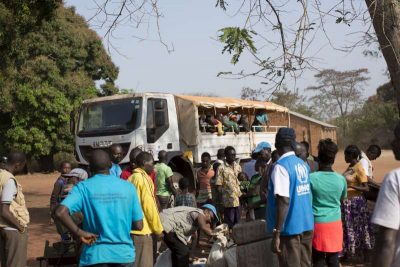By
Peter Louis
Clashes erupted between the so-called ‘Arrow Boys‘ and South Sudanese government soldiers late last year. Schools and hospitals were looted and homes burnt to the ground. Now, Pierre and thousands of other refugees have to move again.
“I thought it was the end of the world,” said Pierre, recalling the day violence caught up with him. “I was in my fields when the fighting began. I dropped everything and rushed home to get my wife and children, but on the way I was taken by armed youths.”
He was held hostage and forced to carry the militia’s supplies, all the while unaware of the fate of his wife or their two-month-old daughter and four-year-old son. He was finally released unharmed after several days.
“I immediately headed back home to look for my family, fearing the worst,” he continued. “When I reached Ezo, I found my hut completely ransacked and my boy inside alone in tears but my wife and younger daughter were gone.”
Pierre took the risk of waiting at home for days to make it easier for his wife to track him down, in case she returned. “She came back after a week,” he said. “I was so happy to see her back holding our baby girl.” The farmer and his family are among thousands of refugees who fled war at home and found safety in this South Sudanese border town and who now have to move again after new fighting broke out there, also forcing aid groups to leave temporarily.
A humanitarian convoy protected by armed peacekeepers last week carried a vanguard of 30 refugees originally from the Democratic Republic of the Congo from Ezo to a new settlement at Makpandu, a town 220 kilometres to the east.
Pierre and his family were among 30 refugees who were the first to be relocated from Ezo to Makpandu, in a convoy arranged by UNHCR, the UN Refugee Agency, South Sudan’s Commission for Refugee Affairs, and World Vision International. Peacekeepers from the UN Mission in South Sudan (UNMISS) provided armed protection for the mission. UNHCR expects to mount more operations as needed for those of the 3,200 Congolese refugees who lived in and around Ezo and are willing to relocate to Makpandu. The majority are believed to have fled back across the border into the DRC, or to the neighbouring Central African Republic.
The violence around Ezo continued into January, and the situation is still so volatile that humanitarian agencies, including UNHCR, are now pulling out.
This conflict is separate from fighting that broke out in December 2013 between South Sudanese soldiers and opposition forces led by the former vice president, Riek Machar, which has driven 2.3 million people from their homes. “We are leaving Ezo with a heavy heart, but security is critical for our staff to operate and deliver assistance,” said Ahmed Warsame, the UNHCR Representative for South Sudan. “Our promise to support the host community remains, and so does our commitment to resume operations in Ezo if the security significantly improves in the future.
For Pierre and the refugees who will move to Makpandu, UNHCR and its partners initially provide welcome help that includes cooked meals, soap, plastic sheeting, blankets, and buckets. Refugees are given a medical check up, including a measles vaccination.
They will soon receive shelter materials and land on which to build a new home. “I hope my family and I can live in peace in this place,” said Pierre. “This is the second time that we have been forced to leave behind our home and farm and start again from scratch. Is this how life is supposed to be?” More than 1.6 million South Sudanese are already internally displaced, and the country hosts 263,000 refugees fleeing conflict or instability in neighboring nations.
Adding to the original conflict between supporters of the president and Machar, and the fighting around Ezo, fresh violence erupted on January 21 between government forces and a local armed group named The South Sudan National Liberation Movement (SSNLM) in Yambio, the capital of Western Equatoria state. At least 15 people were killed, and thousands were displaced.



No Comments Yet!
You can be first to comment this post!